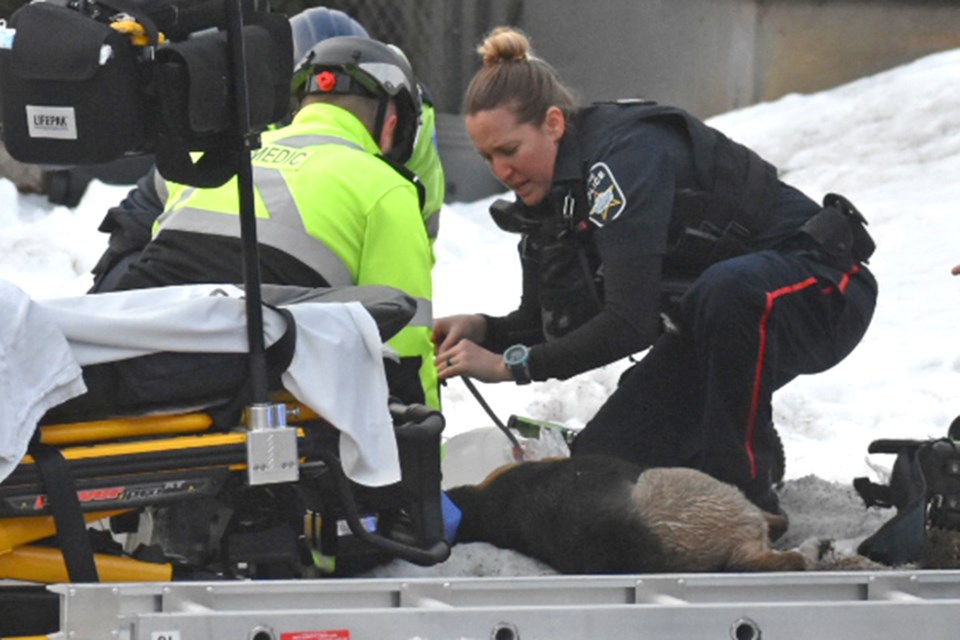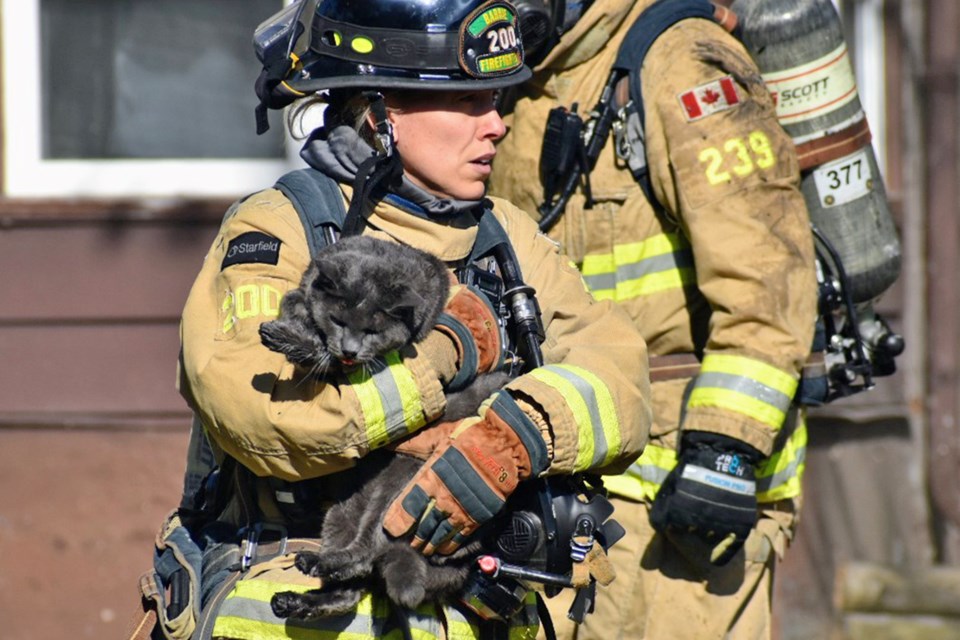The photos pull on the heartstrings: firefighters emerging from a home with a pet, sometimes listless, in their arms.
“Any time you can bring a living creature out of a fire and give them back to their humans is a very positive experience and makes all the training worthwhile,” says Barrie Fire and Emergency Service Deputy Chief Carrie Clark.
“People, property and the environment are the first three lines” of defence for firefighters, she explains.
“We have to rescue the people first, then we do our ultimate best to rescue the pets while containing the fire or managing the emergency — because those pets are just as critical to a lot of people as their human counterparts.”
Barrie firefighters have frequently been called upon to save cherished pets at fire scenes in recent months.
On March, 2 they pulled four dogs and a cat from a fire on Henry Street. A second cat managed to run off, but returned the next day.
Two dogs and a cat were rescued from a Fox Run home, which was billowing smoke, on Feb. 8.
And last Sept. 20, a firefighter emerged from a Wellington Street fire with a deceased cat. A cat from another unit was rescued, however.

Sometimes, says Clark, firefighters will administer some oxygen if there’s concern about smoke inhalation. For many, pets have become important family members.
As emergency preparedness week approaches in May, the Barrie Ontario SPCA branch urges local families to have emergency preparedness plans, which include consideration for the pets.
“Just as it’s important for us to have evacuation plans and emergency first-aid kits, it’s also really important for us to have emergency first aid kids for our pet members,” says Shannon Laflamme, community outreach coordinator for the Barrie SPCA.
The Barrie SPCA is running its own emergency preparedness campaign May 1 to 10 at its Patterson Road animal centre. Key to that is the distribution of decals that can be posted at the front window or door alerting first-responders of the presence of pets in the house.
Emergencies happen at all times, Laflamme adds, including when nobody’s at home. So she encourages families with pets let their neighbours, family members and friends know what pets they have.
The emergency plan should include an alternative meeting place away from the home, she says. And keep a list of emergency and medical numbers, including a veterinarian. It’s also helpful to know about any emergency pet-friendly location including hotels and be familiar with the municipality’s evacuation plan.
A dog collar with an identification tag as well as an updated microchip will help to reunite any pet that might become separated from the family.
In addition to bandages, antiseptic wipes and a towel, a pet first-aid or survival kit should also include information about the pet, a current photo, medication, medical records and, of course, the name of the pet along with an address and a brief description.
Pets have the unique ability to be where they shouldn’t, Clark says. She suggests families create pet-free areas in the home – blocking off the kitchen area so they can’t accidentally hit a dial on the stove, for instance. Pets have been known to chew on electrical cords or knock over space heaters, which are ignition risks.
Another suggestion is to train the dog, or even the cat, to identify the sound the smoke alarm makes and teach them to run to the door at the sound. It’s not bad training for the adults, too, adds Clark.
It is helpful to firefighters if a leash and collar are located near the door to help prevent the pet from bolting out the door.
An empty pet carrier off site, perhaps in the trunk of the car, can also prove to be handy during a fire.
The SPCA’s May campaign will include a contest for a free pet first-aid kit. More emergency management tips will be available online.
Laflamme emphasizes that the SPCA’s role is to support local families and their pets and encourages anyone with a pet who may be experiencing hardship to reach out if they need food or other supplies.
“We are here to give back to our community,” she says. “We want to make sure we can keep pets together with our people.”



